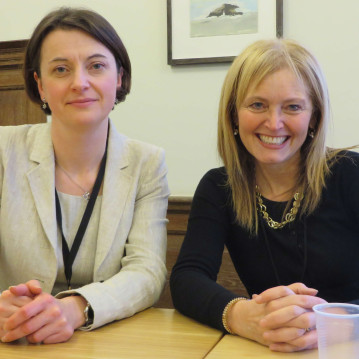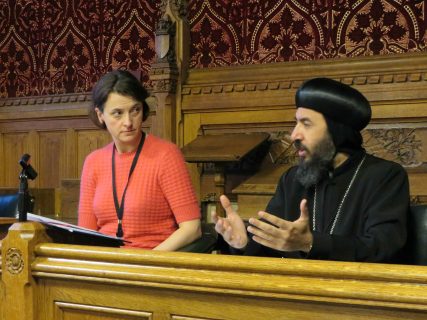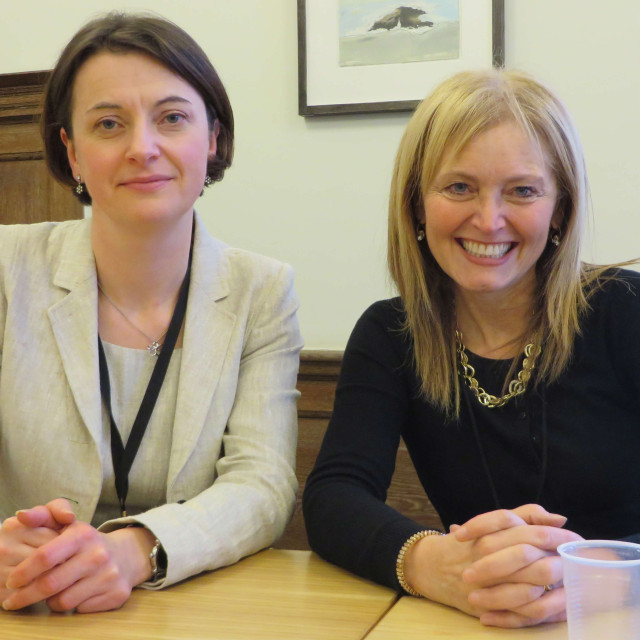
Baroness Elizabeth Berridge, chair of the all-party parliamentary group on international religious freedom (left) and Katrina Lantos Swett, vice chair of the U.S. Commission on International Religious Freedom
I met up with Baroness Elizabeth Berridge, chair of the U.K. All-Party Parliamentary Group on International Religious Freedom, and Katrina Lantos Swett, vice chair of the U.S. Commission on International Religious Freedom, near the Houses of Parliament in London earlier this year to discuss how the two countries plan to work together on promoting religious freedom. I featured Lantos Swett’s side of the conversation last month. Here are Baroness Berridge’s views. This interview has been edited for length and clarity.
Brian Pellot – Why is the U.K working with the U.S. and other governments on religious freedom?
Elizabeth Berridge: We have a shared agenda in terms of Article 18 of the Universal Declaration of Human Rights, which guarantees that everyone has the right to freedom of thought, conscience and religion. This is an issue of growing concern across all continents, and we want to engage with parliamentarians from different parts of the world. I’ve always had a heart for politicians who represent religious minorities in their own countries, who are fighting for religious freedom for all in jurisdictions under oppression.
BP: The U.S., the U.K. the E.U. and Canada all have special teams working on religious freedom. But how do you plan to bring non-Western governments into the fold?
EB: We’re seeking to build a network of parliamentarians rather than governments. We’re trying to find voices in different jurisdictions, reaching out to parliamentarians in South Africa, Brazil and South Korea. I suspect if we went to Australia and New Zealand we’d find partners, but we want to find them in jurisdictions that are not the usual suspects to speak out on this issue. One of the things we’ve been discussing is how not just to prick the conscience of our government but to also mobilize change on the ground for people in different communities who are having difficulties. We have a British citizen, Mohammad Asghar, in prison in Pakistan for blasphemy. There have been recent attacks in Iran on the Baha’i community. So we really want to move from the parliamentary level to making a difference with people on the ground.
BP: What is Britain doing to help Asghar’s case?
EB: He was sentenced to death for the crime of blasphemy. The British government is very concerned and will be making representations about it. But it’s also up to us as parliamentarians to get answers from the government. There is a robust dialogue going on between our government and Pakistan’s, particularly among parliamentarians concerned because Pakistan is the single largest recipient of U.K. aid and we have a very large diaspora of 2.5 to 3 million Muslims here in Britain, the overwhelming majority of which are of Pakistani origin.
BP: We’re talking about more transatlantic and international efforts around religious freedom. Why aren’t these already being done at the U.N., or at least why are those efforts inadequate if you believe new initiatives are needed?

Baroness Elizabeth Berridge (left) and Bishop Angaelos address attendees at the All Party Parliamentary Group on International Religious Freedom’s event on persecuted Christians and asylum seekers at the House of Lords on Tuesday (Oct. 23, 2013) in London.
EB: One of the things that’s been intriguing is the lack of engagement the U.N. has with national parliaments. Over the last 20 or 30 years, the U.N. has been in the process of setting international norms in various areas. There are obviously still disputes about what the international norms around religious freedom should be. But then there’s also a massive implementation gap, partly due to lack of resources but partly because the international infrastructure just doesn’t touch down in some jurisdictions.
I always look back to a trip I took eight years ago to Srebrenica. The U.N. has seen how close their troops were when 8,000 Bosnian Muslim men were basically annihilated. And then you look at the situation in Syria and the Rohingya Muslims in and around Burma today. While the world has been giving justified plaudits to Aung San Suu Kyi, we’ve watched a population that is stateless, that is vulnerable to trafficking, that is open to extremist ideologies develop. And the world is sitting idly by whilst a community that is mainly defined on its religious basis is being left so vulnerable. The pictures are absolutely horrific.
As parliamentarians, we have a responsibility. We have a very large Muslim diaspora community in the U.K., and I’m very passionate about speaking upon their behalf because as someone who holds a Christian faith, too often lazy commentators and journalists put things in a paradigm of, “Oh it’s just Muslim countries against Christians, etc.” It’s not. It’s much more nuanced and complex than that, as you can see.
BP: How are you and your colleagues addressing domestic religious freedom issues within Britain and Europe? There are still blasphemy and religious defamation laws in many countries across the European Union.
EB: Our group focuses on international freedom of religion or belief, but we have found some domestic splash back, particularly in the area of people claiming asylum on the grounds of religious persecution. We’re working with groups representing Hindus, Sikhs, Muslims, Christians, diaspora groups from Egypt, Nigerian denominations and the British Humanist Association. One challenge for our authorities is how to interview someone at the border and prove that they are fleeing not for economic reasons but because of religious persecution.
We’ve also heard anecdotal tales of people who are not free to convert within the U.K. due to family or community pressures. I don’t think we have been as vocal as we should be, particularly given the levels of migration we have into the U.K., that this is a free market, that you can convert, that it’s open competition for people to hold a faith, to not hold a faith, or to change their faith. We’re looking at how better to get that message out.
In terms of issues related to freedom of expression, whether you can wear a cross to work for instance, that’s not what we’re concerned about. There is so much to do with religious freedom that’s connected to life and limb. If we solve those issues perhaps we can look at some of these more nuanced issues within the UK.
BP: Some argue that government-backed freedom of religion efforts privilege certain faith groups over others and lock individuals into particular faith categories and identities. How do you respond to opponents of the APPG’s work?
EP: I think the example of the APPG is exactly the opposite. We have religious and secular groups around the table. So the groups aren’t pitted against each other. These groups believe in Article 18 and want to enshrine it as a human right. We’ve been amazed at the amount of cooperation and the amount of acceptance within these groups around the need to protect other people’s right to religious freedom. We don’t talk theology with these groups because they would disagree on virtually everything, but what they do support is that people have a right to believe or not to believe, and that people shouldn’t be imprisoned or have their liberty affected by that choice.
BP: President Obama’s speech at the national prayer breakfast focused almost exclusively on international religious freedom concerns. What did you think of his remarks?
EB: They’ve obviously been massively encouraging. The U.S. is the superpower, but we do need to move into a broader coalition of countries who are speaking out on this issue. Religious freedom has to be a southern hemisphere as well as a northern hemisphere issue. Mature societies with thriving religious freedom are much better for women’s rights, economics, security and other freedoms like a free press. We need to be making this argument across internationally.





